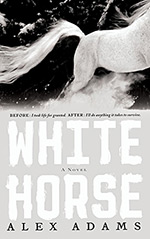
![]() bazhsw
bazhsw
3/19/2017
![]()
A former colleague strongly recommended this book a few years ago and was giving it, 'you have to read this book, it's really good! Do you want to borrow it?'. Now, I normally don't loan books from people, especially when they are recommending them. I've more than enough books on my physical and virtual shelves to last me the rest of my life (well, maybe?). I kindly rejected the offer to lend the book saying I wouldn't get round to reading it for ages. She then turned to me and said, 'well, I'd rather not lend this to you because I want this book to be read.' Clearly, this book had a profound effect on my colleague!
So, the book has been at the back of my mind for about five years now, I've never forgot the recommendation. Therefore, it was of some interest that the book cropped up on the list of available books from the library for our reading group. I've spent two years waiting for our group to read this one. Was it worth the wait?
Unfortunately I cannot match the enthusiasm of my former colleague. I'm not saying it wasn't enjoyable, I read it all and wanted to follow the story through to the end, I was interested in how it all played out but by the end I felt rather unfulfilled by the novel.
The novel is set in a very near future. A pandemic has struck humanity which has killed virtually all the population of the world. Extreme weather conditions and war have contributed to the virtual elimination of the human race. Everything looks pretty much how it used to, except without the infrastructure and organisation of civilisation. This has all happened in a matter of months.
The novel is written from the perspective of Zoe, a young woman living on the East Coast of America and her journey to Europe. The novel is structured in alternate chapters, starting with Then (life before the apocalypse) and Now (the post-apocalyptic future).
I really enjoyed the structure of the novel, the 'Then' chapters almost seem like flashbacks and they are a clever device to slowly describe what happened to lead Zoe to Europe and how society imploded. It's quite clever that the later 'Then' chapters easily segue into the very early 'Now' chapters. The early 'Then' chapters set up a Pandora's Box scenario - Zoe has a jar in her flat which she is unsure whether she should open. They also focus on her family, friendships and love life and through the course of these chapters we see all this crumble as she loses people.
The 'Now' chapters focus on Zoe's travel through Italy and Greece to find someone special to her. In many ways it is reminiscent of much post-apocalyptic fiction, I was reminded of Cormac McCarthy's 'The Road' - the idea of a lone traveller, or small groups of travellers walking through a dangerous landscape, facing threats from other surviving humans. There are also parallels with 'The Book of the Unnamed Midwife' (which I read last year but came out later) which explores pandemics and the particular dangers that face women in a post-apocalyptic world, in particular, motherhood and pregnancy.
Some of the writing in the book is absolutely beautiful. Every so often, you read a sentence so wonderfully crafted you want to read it again. The problem is Adams relies on simile way to often and when you spot their overuse it can become quite annoying. Towards the end of the book, for every beautiful, poignant sentence there is one that makes you roll your eyes.
Sadly, the characterisation isn't so great. Zoe isn't particularly interesting and whilst you root for her when she is in peril, I find her quite unforgettable. Her family and friends from the past are very much background characters. The love interest is so 'vanilla' and hardly seems worth the effort. The people she travels with in the present are a little more interesting, in particular an especially vile misogynistic character with no redeeming features.
This character, known as 'The Swiss' is horrible and is a persistent threat. There are quite a few scenes in the book that are quite difficult to stomach, with sexualised violence which may be challenging for some readers. The scenes are not pleasant, but they are effective. They hit you like a sledgehammer and Zoe's response in some of these scenes are where you root for her the most. I wouldn't have tagged this book as 'horror' but in many ways it is quite a horrific book - there is plenty of graphic violence, unsettling descriptions of mutation and sickness as well as rape and ugly sex.
These 'horror' elements are the strongest part of the book and Adams definitely is able to convey a palpable sense of threat and menace.
I did find it hard to come to terms with the 'new world'. Humanity effectively collapses in a matter of months. Civilisation has largely ended and yet there are still flights and sea crossings, even though cash is worthless and there is no infrastructure. I found that a stretch to believe.
I liked the unwrapping of how the illness started and how that story developed and what Zoe's role is. That said, at times the book dragged a little and whilst I did not see one of the big spoilers coming, nevertheless the novel ended in a ridiculously implausible ending. It really felt disappointing and after all the effort to get 'there', I just thought, 'is that it?'
Apparently, there is a sequel planned but I'm not sure where one would go with this. It was okay, but not really worth the self inflicted anticipation I gave it.